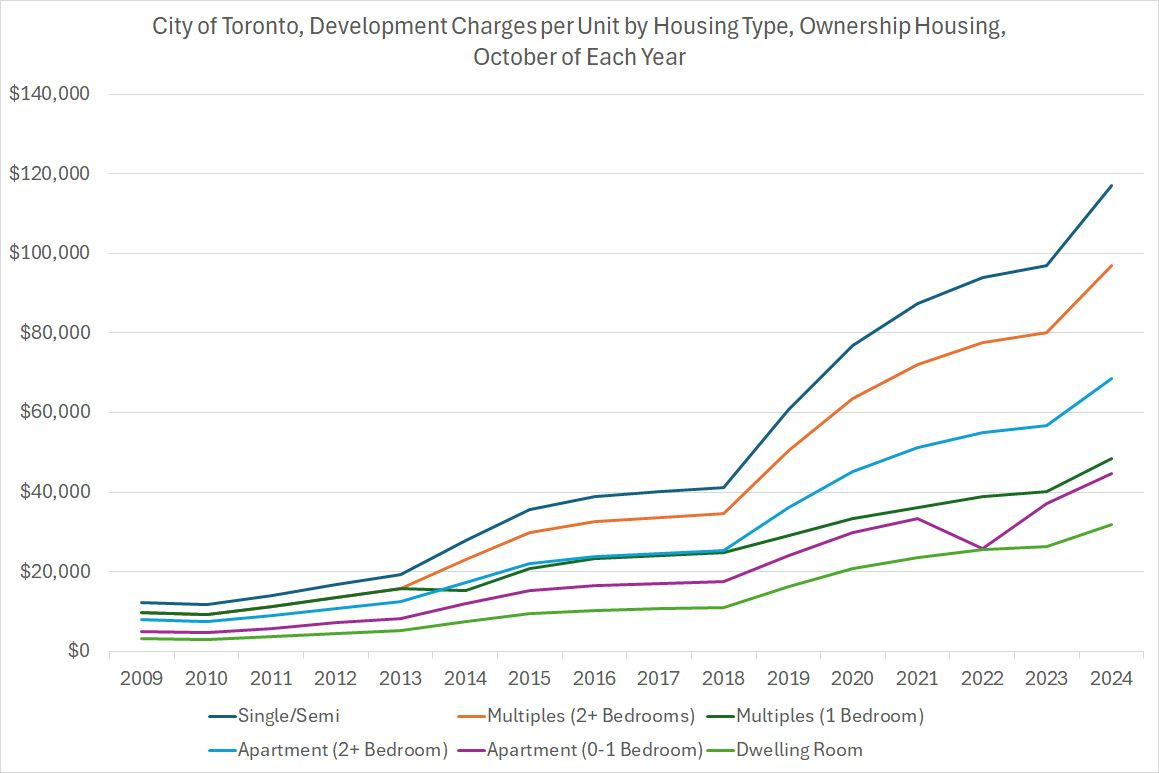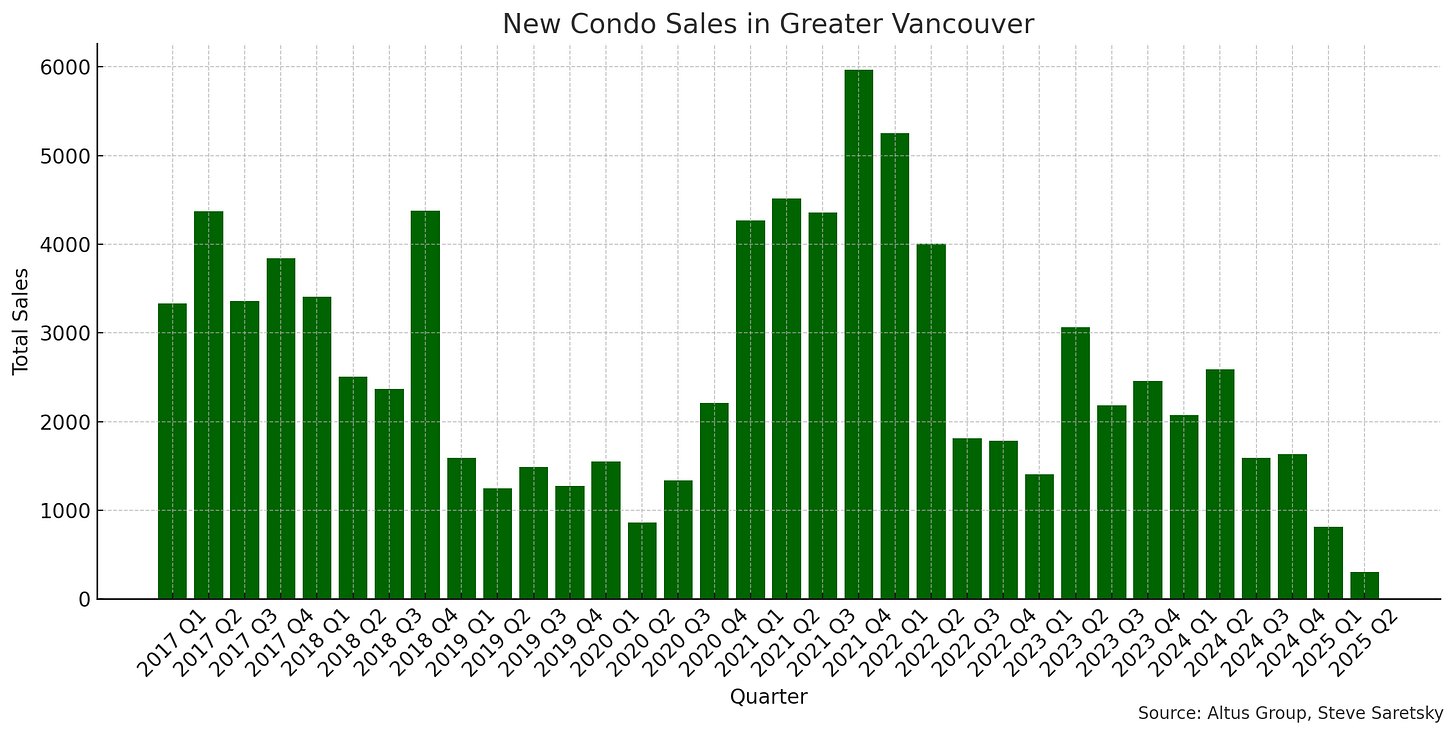Happy Monday Morning!
Last week we titled a piece called ‘A Firehose of Supply’ in which we duly noted,
“The bull thesis for housing this year was falling rates. Sellers have been reluctant to cut prices because rates were supposed to come down and house prices were supposed to go up. Instead, mortgage rates only fell modestly, and demand has languished. And so here we are, left with bloated inventory levels we haven’t seen in decades. There’s so much standing inventory for sale we’re running out of signposts.”
As a result we have near record inventory on the resale market, and prices are tumbling. This is great for buyers, but a death knell for condo developers.
Here’s the reality. A new condo development is years (sometimes a decade) in the making. From land acquisition, to rezoning, to development permits, pre-sales, and and building permits. Proformas are written years ago.
When input costs such as construction costs, city fees, and interest rates suddenly shift higher in dramatic fashion, these costs must get passed on to the buyer at the pre-sale center. And for years they did, despite Canada’s residential construction price index rising 51 % since the start of the pandemic, and development fees in major cities increasing ten fold since 2010.
Everyone got their pound of flesh, especially the government. But it didn’t really matter because buyers kept buying, so developers kept building.
It eventually reached a point where the cost of building new became so expensive, and the market so frothy, that developers were charging 10-20% above comparable resale product. It didn’t matter because prices always goes up!
Until the music stopped.
The bloated resale market has choked the optimism out of the pre-sale market.
New home sales in the GTA hit a seventh consecutive month of record all-time lows according to a new report, eclipsing the 1990s downturn. The report from the Building Industry and Land Development Association (BILD) said that there were 310 new home sales in April, which is down 72% from April 2024 and 89% below the 10-year average.
There were just 105 new condo sales in the entire GTA for the month of April. Down from nearly 4000 units at the height of the bull market.
In Vancouver, things aren’t much better. According to data from Altus Group, there were a total of 816 new condo sales for the first quarter of 2025. That’s down from the 5253 sales at the height of the bull market in Q1 2022. A whopping 84% decline.
There’s simply not enough sales to keep the lights on for a lot of these developers. The industry as a whole is going through a nasty recession. Remember, just a few weeks ago we learned Rennie, the largest pre-sale marketing firm in the city had to cut headcount by 25%.
Unfortunately, the beatings will continue until morale improves.
We just learned the Carney government is going to slash GST on new homes. There’s just one problem, the tax only applies to first time home buyers and only on pre-sale contracts entered into after May 27, 2025. In other words, no relief for the plethora of condo buyers underwater and nearing completion.
There’s no fixing this slow moving train wreck. As we’ve noted before, housing starts are falling off a cliff, it just hasn’t shown up in the data yet.
It seems Brad Jones, CEO of Wesgroup, and one of the larger developers in the city of Vancouver would agree.
“Just two weeks ago, CMHC released April housing start data with headlines saying housing starts are up 30 percent nationwide and up 6 percent in Metro Vancouver. I’ve heard stories from inside City Halls—bureaucrats and politicians thinking this is great news. Prices are down and starts are up. But here’s the problem: that data is lagging by years. CMHC doesn’t count a multi-family project as a start until excavation is complete and the building is back to grade. Lets use our Keary project in New Westminster as an example.
2022 Pre-Sale Launch
2023 Construction Start
2025 Registers as a Housing Start now that the excavation is complete and underground parking is built back to grade
The decision to move forward was made based on economic conditions in 2022, but CMHC just counted it as a start last month. By the time a project is "started" in their data, we are already deep into construction and locked into a path we committed to years earlier.”
I’m aware nobody is going to shed a tear for a developer, let alone a pre-sale speculator. But I will leave you with a few things to ponder. It would appear we are setting policy on horribly lagging data. Nearly 8% of the Canadian labour force is employed in construction, of which 3% are employed directly in residential construction. If we genuinely believe we are structurally short housing, are we sowing the seeds for the next crisis?
Let’s watch.







What policy would you want to see to address this, though?
Supply side: the newish PM is already talking about post-WW2-style government-led construction, for better or worse that would keep homes in the development pipeline. What else could be done, preemptive bailouts for developers, posthoc GST cuts for presales?
I think we are structurally short of affordable housing. That is a big difference. I am sure there is a lot of housing going around, some empty, some used for Air B&B. And as Stats Canada shows, there are quite a few individuals owning multiple houses...